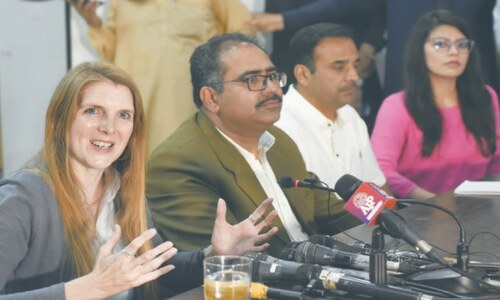ISLAMABAD: Because it is party to the United Nations Convention on the Rights of the Child (UNCRC), Pakistan has to send a periodic report every five years to the UN Committee on the Rights of the Child regarding the steps the government has taken to implement the convention.
The committee in turn sends its concluding observations and recommendations after it also receives reports from various other organisations, including civil society organisations.
On Wednesday, the Child Rights Movement (CRM) hosted a launch of this year’s UNCRC Concluding Observations and Recommendations in collaboration with the United Global Organisation of Development (UGOOD), which is the CRM’s current National Secretariat.
The event started off an hour late, and the organisers had to change their agenda for the seminar, which was attended by journalists, parliamentarians, members of the civil society and a dozen or so primary school students.
This year’s concluding observations and recommendations are in response to the fifth report submitted by the government, appreciate the various steps taken by the government towards the protection of children’s rights, including the ratification of or accession to international instruments and the adoption of a number of new acts.
The committee has recognised the challenges to safeguarding children’s rights, including drought and other natural disasters, as well as law enforcement issues including terrorism. It has suggested that the government also implement the previous recommendations from 2009, including those regarding the drafting of better policies and strategies, data collection, and respecting the views of children.
Though it has appreciated the legislative developments in the country, the committee has expressed concerns regarding the delay in the adoption of some of bills and has recommended the scrutiny of some of the existing laws.
According to the recommendations, though the government has increased welfare spending, the allocation of funds towards health and education is still not sufficient and recommends that financial support be extended to civil society organisations working for child rights.
In its concluding observations and recommendations, the committee has pointed out that though the Sindh Child Marriage Restraint Act raised the marriageable age of both boys and girls to 18, there are many inconsistencies concerning the definition of a child at federal, provincial and territorial levels and recommends that children be defined as anyone below the age of 18 in all laws in the country.
It has pointed out to discrimination against girls and gender differences in infant mortality, school enrolment, early marriages, the exchange of girls for settling disputes, and discrimination against children belonging to religious and ethnic minorities, and expressed concerns about the killing of children in counter-terrorism and terrorism activities – including those killed in the attack on Army Public School, Peshawar and those killed in droughts.
The committee has also expressed concerns about the death penalty being awarded to individuals who were under 18 when they committed a crime.
The Society for the Protection of the Rights of the Child’s Qudsiya Mahtab asked the government representatives present why they turn a blind eye to the violations of child rights.
“The Pirwadhai station is a centre for child sexual abuse. We, the civil society, see that and are trying our best to stop this from happening. But the government can actually stop child sexual abuse; why do you not see what is happening there,” she asked.
She then said more work needs to be done for providing a support system for the children who spend their mother’s sentences in prisons with them and those born in redlight districts.
She shared her experience of working with transgender children and said their abuse starts at home and that they are either thrown out or run away before the age of 18.
“They start being called khusra or hijra at home, by their families. The state should make sure that parents cannot throw their children out and have to care for them at least till the age of 18,” she said.
Published in Dawn, December 15th, 2016














































Dear visitor, the comments section is undergoing an overhaul and will return soon.